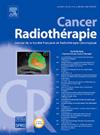Artificial intelligence based on imaging data to predict rectal cancer recurrence: A meta-analysis
IF 1.4
4区 医学
Q4 ONCOLOGY
引用次数: 0
Abstract
Purpose
The purpose of this study was to evaluate the diagnostic performance of artificial intelligence based on imaging data to predict rectal cancer recurrence using a meta-analysis system.
Materials and methods
Medline, Embase, Cochrane Library, Web of Science, and other databases were searched for all articles on artificial intelligence prediction of rectal cancer recurrence based on imaging data published publicly from the establishment of the library to December 31, 2023. The quality of the articles was assessed using Quality Assessment of Diagnostic Accuracy Studies 2 (QUADAS-2). Meta-analysis was performed by the software Revman 5.4 and Statistics data (Stata), and sensitivity analysis was used to detect potential sources of heterogeneity and test to assess the presence of publication bias. We evaluated how well imaging-based data can predict recurrence in patients with rectal cancer by analysing the pooled sensitivity, specificity, and area under the curve.
Results
Ten studies were included. The pooled sensitivity, specificity, and area under the curve of imaging-based data for recurrence in patients with rectal cancer were respectively 0.84 (95 % confidence interval [CI]: 0.74–0.91), 0.87 (95 % CI: 0.82–0.91) and 0.92 (95 % CI: 0.89–0.94). Based on QUADAS-2, the quality of the article is acceptable. We found the causes of heterogeneity through meta-regression: recurrence time predesign Lasso. Based on Deeks’ funnel plot, no publication bias was detected.
Conclusion
Artificial intelligence based on imaging data has a high predictive ability for rectal cancer recurrence.
基于影像数据的人工智能预测直肠癌复发:荟萃分析
目的本研究的目的是利用荟萃分析系统评估基于影像数据的人工智能预测直肠癌复发的诊断性能。材料与方法检索medline、Embase、Cochrane Library、Web of Science等数据库,检索该库建库至2023年12月31日公开发表的基于影像数据的人工智能预测直肠癌复发相关文章。使用诊断准确性研究质量评估2 (QUADAS-2)对文章的质量进行评估。meta分析采用Revman 5.4软件和统计学数据(Stata),采用敏感性分析发现潜在的异质性来源,并检验是否存在发表偏倚。我们通过分析综合敏感性、特异性和曲线下面积来评估基于成像的数据预测直肠癌患者复发的效果。结果纳入10项研究。基于影像资料对直肠癌患者复发的综合敏感性、特异性和曲线下面积分别为0.84(95%可信区间[CI]: 0.74-0.91)、0.87 (95% CI: 0.82-0.91)和0.92 (95% CI: 0.89-0.94)。基于QUADAS-2,货物的质量是可以接受的。我们通过meta回归发现异质性的原因:复发时间预设计Lasso。根据Deeks漏斗图,未发现发表偏倚。结论基于影像资料的人工智能对直肠癌复发具有较高的预测能力。
本文章由计算机程序翻译,如有差异,请以英文原文为准。
求助全文
约1分钟内获得全文
求助全文
来源期刊

Cancer Radiotherapie
医学-核医学
CiteScore
2.20
自引率
23.10%
发文量
129
审稿时长
63 days
期刊介绍:
Cancer/radiothérapie se veut d''abord et avant tout un organe francophone de publication des travaux de recherche en radiothérapie. La revue a pour objectif de diffuser les informations majeures sur les travaux de recherche en cancérologie et tout ce qui touche de près ou de loin au traitement du cancer par les radiations : technologie, radiophysique, radiobiologie et radiothérapie clinique.
 求助内容:
求助内容: 应助结果提醒方式:
应助结果提醒方式:


